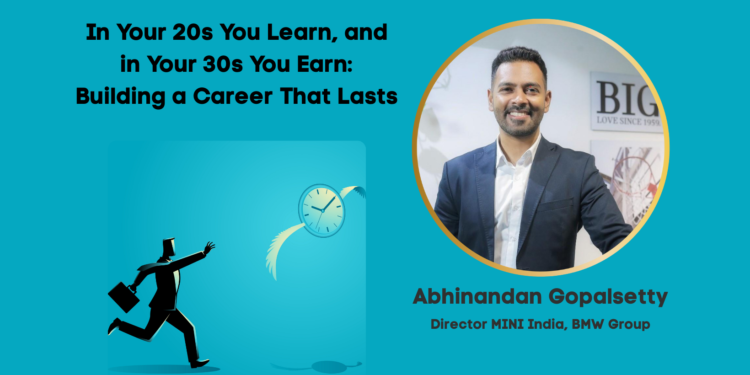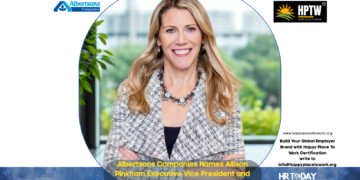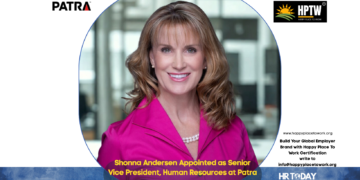The decades of your 20s and 30s are not just numbers on a timeline—they represent distinct psychological and professional phases. While the 20s are a training ground for skills, self-awareness, and relationships, the 30s are a platform to capitalise on that preparation. For any corporate professional starting out, this framework can be highly insightful on setting their expectations and objectives right in the early part of their careers.
Your 20s are your foundation. It’s where you build your professional identity, experiment with your path, and also sometimes fail. Only to grow. This article hereon synthesizes experiential insights with practical recommendations to enable guaranteed success.
It begins with recognising that while knowledge is important, attitude defines your trajectory, and that first impressions—both in appearance and conduct—can open doors long before competence has the chance to prove itself. Along the way, you learn that success depends as much on working effectively with people as it does on mastering tools, and that managing expectations transparently builds trust faster than overpromising. You discover that if you’re not looking forward to work, it’s time to reflect and realign, and that small talk is in fact a big connector, enabling rapport and influence. To sustain your performance, you make fitness and balance non-negotiable, set goals both big and small to maintain momentum, and network relentlessly to create opportunities before you need them. You keep your resume sharp as a reflection of your evolving value, while embracing data and digital fluency to stay ahead in an increasingly tech-driven workplace. Through it all, you take time to find your authentic self before the world defines you, and remember that money is the consequence of creating value, not the starting point. Together, these principles form a blueprint for a career—and a life—rooted in resilience, clarity, and purpose.
Knowledge is 20%, Attitude is 80%
Technical know-how is essential, but in your 20s, what truly distinguishes a high-potential professional is attitude. A willingness to learn, unlearn, and grow often outweighs any degree or certification. Most companies today are willing to train you in tools and technologies—but what they cannot teach is your approach to failure, how you take feedback, how you show up on hard days, and how you treat others. Being dependable, proactive, coachable, and curious creates a professional brand early in your career. Attitude forms the foundation on which knowledge can be built sustainably.
First Impressions Matter—More Than You Think
In professional settings, impressions are formed in the first few seconds—before you’ve even spoken about your work. This includes your grooming, body language, handshake, eye contact, and tone. But it also includes your email writing style, meeting etiquette, punctuality, and response times. These micro-moments influence how seriously people take you and whether they trust you with responsibility. While competence builds respect over time, first impressions open the door for that trust to form. Investing effort in your appearance, articulation, and approachability early on pays off for years to come.
Learn to Work With People, Not Just Tools
Your technical skills will get you hired, but your people skills will decide how far you go. The modern workplace is deeply collaborative—requiring you to work with people from different cultures, age groups, departments, and even countries. Each individual comes with a unique personality, pace, and process. Learning how to navigate egos, give feedback, take criticism, and still drive outcomes is what sets professionals apart. The ability to manage upwards, sideways, and downwards is a subtle art that begins with active listening, empathy, and clear communication.
Master Expectation Management
Managing expectations is not about doing less work—it’s about creating clarity and avoiding misalignment. In your 20s, one of the fastest ways to gain credibility is by being someone who delivers consistently. But even more valuable is the ability to communicate timelines, limitations, and trade-offs transparently. If you’re unable to meet a deadline, say so early and explain why. If you’ve achieved more than asked, showcase it with humility. Learning to set the right expectations with bosses and colleagues reduces stress, builds trust, and leads to better working relationships.
If You Don’t Look Forward to Work, Something’s Off
While not every workday will be exciting, a general sense of purpose and motivation should be present. If you regularly dread Monday mornings or feel emotionally drained without any major trigger, it’s a signal that something is misaligned. It could be the role, the culture, the leadership, or even your own expectations. Don’t ignore these signals—use them to reflect, talk to mentors, or explore new paths. Early self-correction helps you avoid burnout and disillusionment. Remember, you don’t have to love every moment of your job, but you should feel that it’s helping you grow.
Small Talk Isn’t Small at All
Small talk often gets dismissed as superficial, but it’s a powerful tool for connection and influence. Water-cooler conversations, casual greetings, or pre-meeting banter help build rapport and make you more approachable. Being able to discuss trending topics, sports, books, travel, or even the weather in a light, engaging way shows social intelligence. It’s especially valuable in cross-functional or client-facing roles. To get better at it, stay updated on the world—read the news, follow cultural shifts, and be curious about others. Great leaders are often great conversationalists too.
Fitness and Balance Are Non-Negotiable
Work is important, but so is your body and mind. In your 20s, it’s easy to push your health aside for deadlines and hustle. But this is exactly when foundational habits are formed. Regular exercise, healthy eating, sleep hygiene, and emotional regulation build long-term resilience. Moreover, maintaining boundaries and balance allows you to work more productively, not less. Leaders today value well-rounded professionals who prioritize well-being because they tend to burn out less, contribute more, and lead by example. Make fitness and mental wellness a priority—it’s the ultimate productivity hack.
Set Goals—Even the Lame Ones
Having goals gives you direction. They don’t all need to be deep or noble—some can be fun or materialistic. Wanting to own a BMW at 35 or take a solo trip to Japan can be just as motivating as wanting to lead a team. The key is to break these into short, medium, and long-term actions. When goals are written down, they become more real. Reflect on them every quarter. Share them with mentors. Let them evolve. In the absence of goals, you risk drifting. With them, you have momentum—even on the hard days.
Network Relentlessly
Most opportunities in life come not just from what you know, but who you know. Yet many young professionals hesitate to reach out to seniors or peers for fear of rejection. The truth is—people love to help. Reconnect with college alumni, speak to industry seniors, attend events, ask for introductions. But don’t make it transactional. Build relationships. Offer value. Be curious. Share your goals, ask thoughtful questions, and follow up. A strong network can offer you jobs, collaborations, perspectives, and even friendships. Build it before you need it.
Make a Strong Resume—Even If You’re Not Looking
Your resume is your personal billboard. Even if you’re not actively applying, it’s a record of your achievements and a great tool for self-reflection. Keep it updated every six months. Document key projects, metrics, and outcomes. Write in active voice, focus on impact, and tailor it to your evolving role. A good resume isn’t just for job hunting—it’s for performance reviews, promotions, or speaking engagements. Make sure it reflects not just your experience, but your value. And always keep a version ready—you never know when opportunity will knock.
Data and Digital Fluency Set You Apart
No matter what industry you work in, digital tools and data literacy are critical. In your 20s, you have a unique advantage—you’re native to technology. Make use of it. Learn Excel, analytics, dashboards, automation tools, or even basic coding. Understand how to read data, extract insights, and present them visually. This makes you valuable in every team, from marketing to HR to finance. As businesses become more data-driven, employees who can translate numbers into decisions will lead the way. Digital fluency isn’t optional anymore—it’s a differentiator.
Find Yourself—Before the World Tells You Who You Are
Most of us grow up following a script—study hard, get a job, get promoted. But your 20s are the perfect time to pause and ask: Who am I really? What do I enjoy? What energizes me? Go on a solo trip. Take up a side project. Switch roles. Read outside your field. These experiments are not distractions—they’re how you discover your unique path. If you don’t explore, you risk building a life based on others’ expectations. True career fulfillment comes from alignment with your authentic self.
Money Is the Consequence, Not the Goal
It’s natural to care about money in your 20s—especially when you’re comparing salaries or watching peers jump to higher-paying jobs. But focusing only on money can lead to short-term decisions that hurt long-term growth. Early roles should be chosen for what they teach you, not just what they pay. Skills, mentors, and exposure are far more valuable in this decade. When you focus on doing great work, solving real problems, and building your brand—money inevitably follows. Let income be the outcome of value you create, not the sole measure of your worth.
Ultimately, the journey from your 20s to your 30s is not just a career progression—it’s a personal evolution. The habits, relationships, and mindset you cultivate early on become the blueprint for the professional—and person—you grow into. Learning to embrace curiosity, resilience, and authenticity prepares you not just to earn more in your 30s, but to lead with clarity and purpose. The world of work will keep changing, but those who invest in learning, build genuine connections, and stay aligned with their values will always stay ahead. Your 20s lay the groundwork—make them count, and the rewards will follow.
Read Also : When HR “Produces Nothing”: A Response to Jennifer Sey’s Anti-HR Vision
The Fine Balance: Navigating Work, Life, and Mental Wellbeing
Mind the Leadership Gap – From Learning to Real-World Impact
How the Adecco Group is empowering its employees for the future of work













